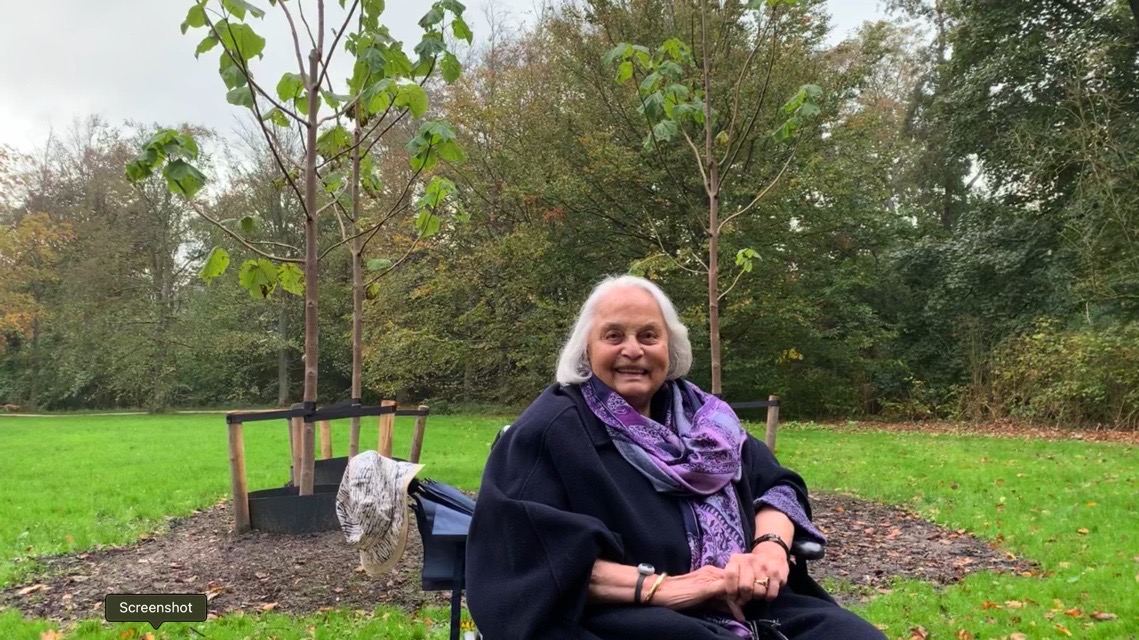
03 Jan 2023
It was with great sadness that the board of the Indonesia Nederland Society took note last year’s summer of the death of Wilhelmina Johanna ter Kulve – van Os, our driving force and great inspiration. Born on 2 March 1927 in Semarang in the former Dutch East Indies, she died on 5 July 2022 in her apartment in Wassenaar. Joty ter Kulve- van Os became 95 years old.
In the contribution below, Monica Bouman reminisces about Joty, in which many will recognize themselves.
IBU JOTY WAS HERE
I miss you, Joty
I miss our conversations.
I miss your warm interest, the world we shared.
I feel a void – your warmth is gone.
We were tough, always young
as long as we got worked up about the things of the big, the small world,
as long as we shared our ideals
and then often burst out laughing and then
went on with more courage for our own small contribution.
How nice it was to enter Stoephout, on the way to you.
And how rich I drove back home after visiting you.
Joty, I miss you
You were loved by many. Your genuine interest in people and positive attitude to life certainly contributed to this. To your Indonesian friends, including many young people, you were their Ibu Joty. For your Dutch friends and the residents of Stoephout you were Joty ter Kulve, but mostly just Joty. For me, Joty, you also became my Ibu Joty. Your children and grandchildren have had to share you with many. I am grateful to them for that.
At the beginning of this millennium you had found a new way to look at Indonesia and you wanted to share it with many. I first met you during a lecture in the house of Initiatives of Change on the Amaliastraat in The Hague, where I regularly visited. The way you talked about Indonesia was new to me; I knew how to make new connections with the Indonesians, but the fact that you did that precisely from your Dutch-Indies background touched me. You had gone through a development that appealed to me. We started working together and our friendship has deepened ever since. In the autumn of 2006 you invited me to go with you and your brother, Wim van Os, to Linggajati for the sixty-year commemoration of the Linggajati conference. Besides a privilege it was also a great experience to me. Looking back on those memorable days in November, I now see more clearly how both of you by connecting your personal life story to world history placed the break between two countries in a positive development.
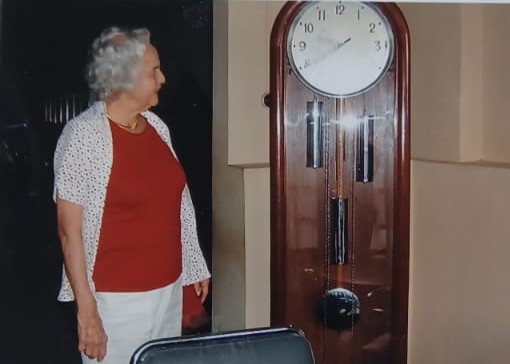
The standing clock of your childhood was still there. Memory of happy times and of the passage of time, on which you look back gratefully in this photo. The clock was no longer ticking, but time had many more dimensions for you.
That day we (you, Wim and your five guests) left Jakarta early in the morning with a van and driver. At the end of the afternoon we drove into the mountain village of Linggajati to visit the house. The arrival route was already festively decorated for the 60th anniversary of the signing of the Linggajati Agreement (15.11.1946) which would be celebrated the next day on the grounds of the house of negotiations. For this celebration we had come all the way from Holland.
In the autumn of 1946 the unilateral declaration of independence of Indonesia on 17 August 1945 by President Sukarno was not (de jure) accepted by the Netherlands. New post-war relations between the Netherlands and Indonesia, which by the Dutch government was still seen as a Dutch colony, had first to be negotiated by both parties. In 1946 after a first attempt during the negotiations on the Veluwe, a second round followed in November in Linggajati, between a Dutch delegation and a (de facto) Indonesian delegation chaired by the British Lord Killearn. For these negotiations, the delegations had settled for three days in the mountain village of Linggajati in West-Java. The negotiations had been tough, but concluded with a draft agreement, signed by both delegations on 15 November 1946. This document laid the foundation for the eventual transfer of sovereignty from the Netherlands to Indonesia on 27 December 1949. It was immensely tragic that the intervening period was marked by violent conflicts. It was the painful birth of Indonesia as an independent state and the letting go by the Netherlands of the Dutch East Indies as its colony. Through the intervention of the United Nations, this process in the end was settled by negotiations and not by war.
In that turbulent period you all on your own left for the Netherlands by boat to start studying Indian Law in Utrecht. When the Linggajati agreement had to be ratified in the Dutch parliament in December 1946, Dutch politics and Dutch public received the ‘Indies question’ with disgust. The atmosphere was grim, the mood negative. ‘Dutch Indies lost, disaster born,’ was the slogan of various spontaneous demonstrations. You were one of the activists. How differently you would look at the Indonesian struggle for independence much later in your life.
The afternoon in the mountain village Linggajati was warm and languid. The streets were deserted. Around the house, scattered across the dry lawns, purple-colored bougainvillea bloomed. We wandered through the quiet rooms of the house, where it was wonderfully cool inside. For you and Wim this was a special reunion. Old memories came back. Because of the war experiences you had grown up at a young age, but actually you were still teenagers when you said goodbye to the Dutch Indies / Indonesia. With pain in the heart and a feeling of homelessness, you had broken with your motherland. Just like the more than 200,000 returnees who in the fifties of the last century preferred an existence in the Netherlands or elsewhere over the young Indonesia. Among them were also my parents and family.
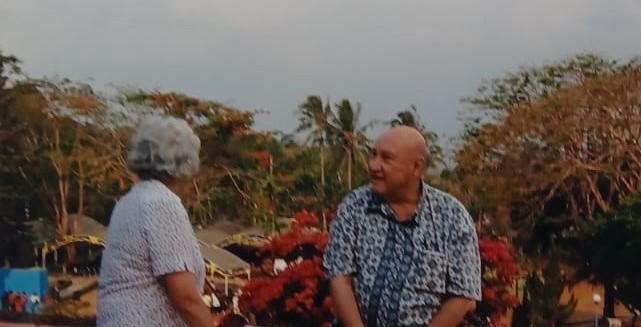
Wim was the first to return to his native country. He loved the country and the Indonesians. As a medical specialist, he was involved in Dutch medical aid programs to Indonesia. On one of his trips he visited the old house in Linggajati, which was still built by your father and where you had lived as a child. He was shocked by the dilapidated state in which the house was and took it on. Back in the Netherlands, he shared his concerns with you. Together you decided to draw the attention of the Indonesian government to the historical value of this Indonesian-Dutch heritage. Then you set up a foundation, Friends of Linggajati, to investigate with the cooperation of the Dutch and Indonesian governments whether the house could be restored and preserved as a museum.
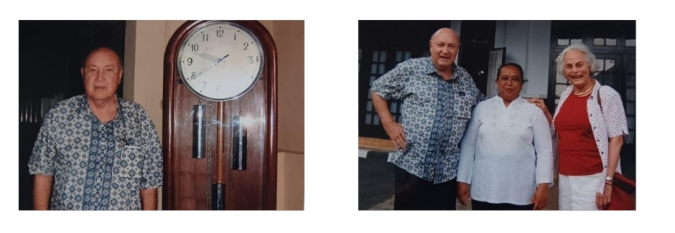
From the Indonesian side you received support from Jakarta for this project and also from the Kuningan region. The house became the ‘Museum Perundigan Linggajati’ (the Linggajati Conference Museum). Under the inspiring leadership of the bupat of Kuniningan Mr. Aung Hamid Suganda the memorial service would take place on the grounds of the Linggajati Conference museum. In the meantime, you and Wim had personally become friends with the Suganda couple.
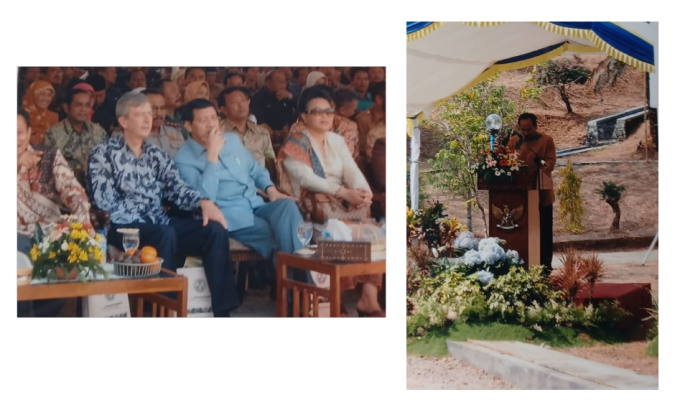 The next day the sixtieth anniversary was celebrated with the Dutch ambassador Koos van Dam and the Indonesian Minister of Foreign Affairs, Hassan Wirajuda as guests of honor. They met that morning at the train in Jakarta and had travelled together via Cheribon to Linggajati. Koos van Dam still has good memories of their conversations during the trip.
The next day the sixtieth anniversary was celebrated with the Dutch ambassador Koos van Dam and the Indonesian Minister of Foreign Affairs, Hassan Wirajuda as guests of honor. They met that morning at the train in Jakarta and had travelled together via Cheribon to Linggajati. Koos van Dam still has good memories of their conversations during the trip.
In addition to the official speeches, the day’s program offered musical performances, a festive lunch and a symposium. In his address minister Wirajuda stated, that the Linggajati Conference Building, while still bearing the elegance of its original architecture, stands as a monument to one of the most important moments in Indonesia’s history. ‘As a well-maintained and revered national building, it has come to symbolize the ideals, principles and values for which the founding fathers have fought. Edifices like the Linggajati Museum are a national treasure.’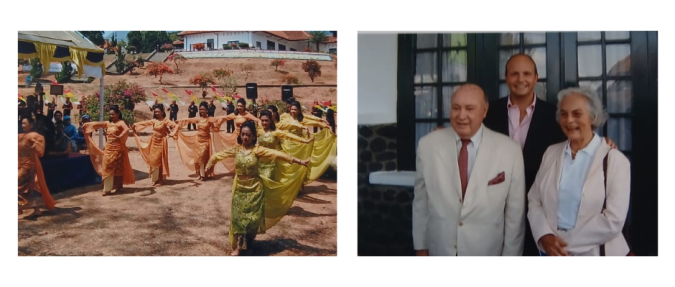
You too were the happy and proud guests of honour of the Bupati that day. That can be seen in the photo, which, in addition to Wim and you, also shows son Peter ter Kulve, who had joined us the night before.
Your children were grown up and you still lived in Sticht Delden in Twente, where you and your late husband lived since your marriage. Before that, as a young woman, you had traveled the world for ten years as part of peace initiatives of the world movement to which you were affiliated. On the website of Initiatives of Change Nederland there is a biography of you, written by Hennie de Pous- de Jonge, ‘As long as you remain hopeful, life finds a new task for you’ | IofC Nederlands In Twente you regularly came to meetings of the Indies community living there. In the immediate vicinity Integrated into Dutch society the dozens of families lived in the cities and villages. Along your mother’s family line, you too had a Dutch-Indies background, which you cherished during various meetings and party nights.
Until then, you had little attention for the struggle for independence of the Indonesians. Your interest in Indonesia and the Indonesians came to life through the conversations with your brother Wim. When you started actively working for the preservation of the house in Linggarjati, your appreciation and respect for the new Indonesia and for the Indonesians grew. In 2011, when you were living in the Van Ommerenpark in Wassenaar, you came into contact with Twan Spierts, a student of the film academy who was looking for a subject for his graduation project. Together you decided to shoot film in Linggajati. Wondering if you would make it on your age (85) and with your health, you had the courage to take the trip.
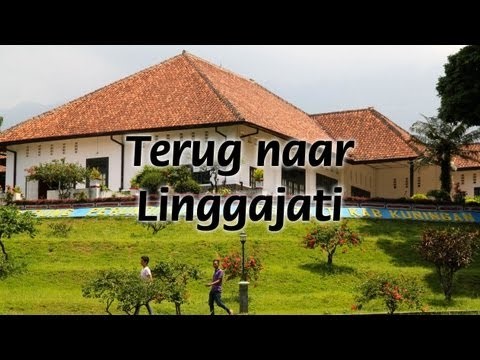
The film by Twan Spierts lets you tell the history of the negotiations and their significance for Indonesia. The fact that you were genuinely happy with that does not leave out that you had to process your own grief in your life. You hadn’t become bitter and loved people. The words of the old church father and philosopher Augustine fit your lifestyle: “We are the times. As we are, the times are.’ The film by Twan Spierts can be viewed on the internet and has attracted thousands of viewers worldwide. Click here to see the film.
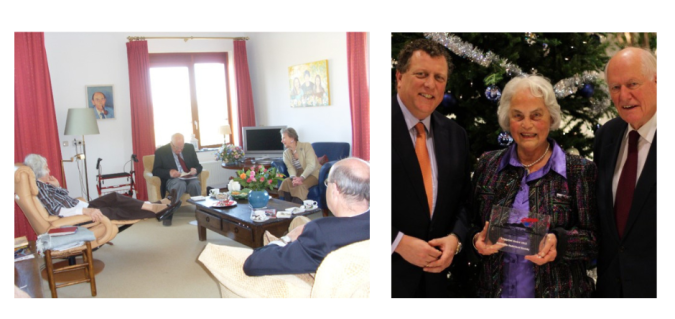
The trip had physically demanded a lot from you and the death of Wim in the summer of that year also touched you deeply. In the meantime, willem van Eekelen, former minister of defense, and Arnold van Os, eldest son of brother Wim, were willing to think with us about setting up a new foundation. I was there myself. Now that the museum in Linggajati had been realized, the Friends of Linggajati foundation could be dissolved. However, there was still plenty to do to improve the relationship between the Netherlands and Indonesia. That’s how we came to the creation of this Indonesia Netherlands Society (INS), which was launched in The Hague on 22 March 2012. As a trustee, you chose a less prominent place, but your drive did not diminish. Under the chairmanship of Jesse Kuijper, the board decided to establish the Linggajati Prize, which was the first to reach you in December 2012. The prize would later also be awarded to Dr. Bernard Bot (former Minister of Foreign Affairs), Dr Hassan Wirajuda (former Mister of Foreign Affairs of Indonesia), Dr. Arifin Siregar (former Minister of Trade) and Mrs. Retno Marsudi (former Ambassador for Indonesia in The Hague).
The year 2020 was also a milestone, when the mayor of Wassenaar invited you to submit a plan to commemorate 75 Years of Freedom. You wanted to plant a living monument for the children of today and for future generations and wild trees, because you were very worried about the environment and the climate crisis and were happy with the tropical rainforests of Indonesia. You therefore felt that these should be preserved. With the cooperation of many, this resulted in the planting of trees for the planet and its inhabitants; three freedom trees in Wassenaar – which remind us of the bond between the Netherlands, Indonesia and the United Nations – and 500 Meranti trees on Kalimantan.
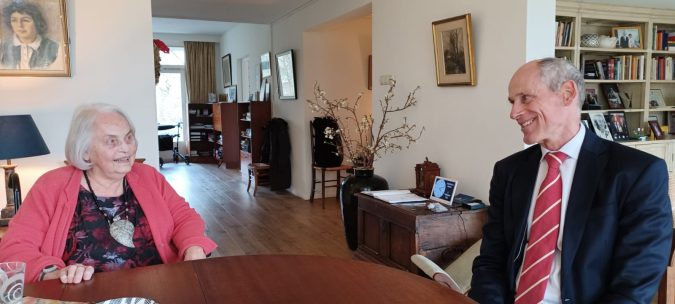
On November 15, 2021, Lambert Grijns, Dutch ambassador to Jakarta, honored you with a telephone conversation. In this way, together you celebrated that 75 years ago the Linggajati negotiations were concluded with an agreement. Your animated conversation was continued when the ambassador visited you in your apartment on Stoephout during his short stay in the Netherlands in February 2022. A photo of this meeting shows the value each of you attached to personal conversations.
Looking at the first photo of this article we see you sitting in your wheelchair in front of the three freedom trees. Ernst, the photographer, has immortalized your radiant presence for us. Dear Joty, may you remain so in our memory.
2 October 2022
Monica Bouman



